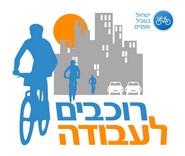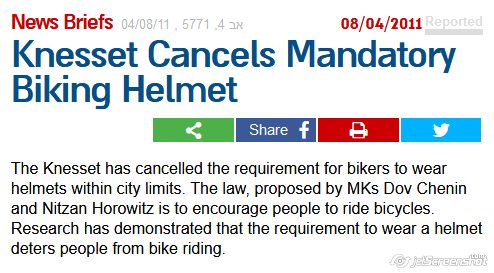31-Aug-2011
by Eran Shchori,
bike2work project manager and “public policy” team member, Israel Bicycle Association (‘Israel Bishvil Ofanaim’)
The compulsory helmet law was legislated four years ago, in 2007. Many activities were necessary in order to prevent it from being legislated but the law’s initiator, MK Gilad Erdan, was powerful enough to overcome opposition to the law. Our activities included organizing an “underwear ride“, writing long papers to argue our points, creating a Facebook page and a dedicated web site against it. Although we failed to prevent the legistlation, we immediately started a campaign for its cancellation.
In August 2011, after a long campaign, the law was revised. According to the revision, everybody has to wear a helmet excluding adults bicycling on urban roads.
Since one of our targets is lowering barriers from cycling, and since wearing helmets is a potential barrier for some from commuting, this was a great success. How did we achieve this success?
Two Separate Battle Fields
We identified and acted in two battle fields – the political arena and the logic/research/statistics arena.
In addition to these main “battle fields”, there is a third group of players – road cyclists and mountain cyclists – who we communicated with. Many of them opposed our attitude as they always wear helmets during their cycling activities. Although they were not decision makers, we feel they are “a part of the family”, so it is important for us to convince this group that we are not against wearing a helmet but that we are against making it compulsory. We had numerous discussions with such cyclists over the internet. We convinced many of them with our arguments, but many others are convinced that changing the law is a mistake and that wearing a helmet should be compulsory.
The decision makers for such a revision are the Members of Knesset (the Israeli Parliament). Although we were armed with good arguments for revising the compulsory helmet law, MK’s rules of decision are complex and their interests affect their decisions, regardless of their true attitude towards public safety, public health and the compulsory helmet law.
The opposite could be said about our main opponents. These were road safety NGOs who claim to be dedicated and interested in public road safety. We hoped that if we could show them the updated academic research and empiric results from around the world, they would be persuaded to change their “state of mind” and help us in our efforts, or at least not fiercely oppose our efforts as they used to do. These NGOs, especially “Or Yarok” (“Green Light”) and “Beterem” (“In advance”), are wealthy, powerful organizations. I proved to be wrong as they kept fighting the idea of revising the helmet law till the final hearing at the Knesset, and beyond.
The political arena – the political partners
Before we went to those battle fields, we tried to make some friends within the establishment. The Ministry of Transportation and The National Road Safety Authority opposed the change in the law. We talked them into supporting us. It took some time and effort (including organizing “the first soccer game played with helmets”; publishing pictures of celebrities riding with no helmets; writing comments (talkbacks) on related news stories, etc.) to make them pay attention, but when they were convinced of our claims they became strategic supporters. Their support was crucial as the law revision proposal originated from the opposition part of the Knesset, yet we got government support.
We had the good fortune that our cause drew the attention of two of the best legislators in the Knesset. MK Shelly Yekhimovich, who brought the revision to the Knesset on our behalf, is an enthusiastic urban bicyclist with a strong social-democratic agenda. She is running for the leadership of the Labor party. MK Dov Khanin from Khadash party is fighting for social justice. They both are “soul players”. They both deeply understood the importance of revising the compulsory helmet law.
The political arena – the municipal partner
For the political arena, we found the best partner with political power – the Mayor of Tel Aviv city, Mr Ron Huldai. With our encouragement, Mr Huldai made a strategic decision two years ago that bicycles are a part of the solution, not a part of the problem. One of his pro-bicycling projects was the bike-sharing scheme. The helmet law interfered with the project but Mr Huldai was determined enough to launch the bike-share scheme a few months ago. Still, the law had to be revised so it will not become an obstacle to its success, as it is in Melbourne, Australia.
The logic/research/statistics arena
Since the total compulsory helmet law was legislated four years ago, Israel Bicycle Association (“IBA”) has tried to revise it. Various activities were organised and academic papers written against the helmet law by several of IBA’s volunteers. I joined the efforts only a few months ago when I realized the high barrier and negative effect this law might have on our efforts to encourage bicycling.
The first step on my behalf was writing an email message with detailed arguments against a compulsory helmet law. The addressees to that message were our toughest opponents – the NGO, “Or Yarok” and several neurologists who gave “Or Yarok” their “medical establishment” backup. Several long conversations with those neurologists were not helpful neither (“Or Yarok” officials refused to let me have the email address of their CEO). This email message evolved to become an orderly, reasoned article with the provocative title: “Reports: the helmet law might endanger bicyclists”. The article put the arguments, numbers and graphs in an orderly way and was a truly global effort of Organizations and Individuals From Israel – Dr Daniel Mishori, Dr Shaul Katzir, Noam Sever, Prof Mayer Brezis, Yotam Avizohar and myself. From the European Cycling Federation (ECF) – Dr Randy Rzewnicki, Dr Bernhard Ensink (Secretary General of ECF). From Denmark – Mikael Colville-Andersen (a public opinion leader – Copenhagenize.com). From France – Francis Papon (a researcher who wrote the paper “Helmet wearing reduces cycling”). From Australia – Prof Dorothy Robinson, Prof Chris Rissel and Chris Gillham who gave me data and insights from the unfortunate Australian case. I hope to be able to translate the article I wrote into English, but meanwhile you may view the source here and the automatic translation (by translate.google.com) here.
Letters from opinion leaders and researchers mentioned above became an integral part of the data-backed article and were addressed to the Members of Knesset.
Prior to the last meeting of the economics committee which was supposed to decide whether to pass the law to second and third (final) hearing, I wrote a shorter article titled “Towards the hearing in the Knesset: a revision in the helmet law” (source in Hebrew, automatic translation to English) and a “one page” list of arguments (source in Hebrew, automatic translation to English).
Despite my initial intentions, the political advisors advised us not to make “too much noise”, so I refrained from sending the mentioned articles and letters in a wide distribution and did so only to a select number of MKs.
The real game – the political game
Parallel to efforts in making our arguments as clear as we could, there was a political effort as well. The efforts were made by MK Shelly Yekhimovich, MK Dov Khanin, Mayor Ron Huldai, his personal assistant Amit Weinberg and the political advisor Moshe Bibi.
On the day of the second and third hearing we came to the Knesset to make final lobbying and to make sure we have a win. Yotam Avizohar and I knocked on the doors of supporting MKs to make sure they’ll attend the final hearing, and had several “cafeteria talks” with opponents.
The final hearing took place late at night, at 3:00 AM. We lost some of our supporters due to the late hour but at the final count we had 17 “Yes” votes and 2 “No”. The revision in the compulsory helmet law was finally accepted. Adults bicycling on urban roads do not have to wear helmets anymore.
Final notes – Follow our steps
For those few countries with a compulsory helmet law (Australia, New Zealand) or with a risk of enactment of such law (U.K), we suggest you follow our steps – do not try to cancel the helmet law. Our advice to you is to change it so that adults bicycling on urban roads would not be enforced to wear helmets. This is the main obstacle as sports bicyclists and mountain bicyclists usually wear helmets (as we believe they should) regardless of a compulsory law.
Epilog
The long battle consumed many work hours from our volunteers. Yet during the process the NGO got a countrywide exposure and many decision makers from all levels were exposed to our activities. We created and strengthened our work relations with MKs, various Ministries and with the Mayor of Tel Aviv city. These work relations are leveraged in many ways. Israel Bicycle Association is positioned today in a much better place than before the battle began, and our views are respected. As a consequence we initiate policies and our voice is better heard when policies are determined. The law for cycling encouragement will hopefully be legislated in the next few months, taking Israel to another level of promoting cycling culture.
Related articles:
Reports: the helmet law might endanger bicyclists (Hebrew, Automatic translation to English).
Towards the hearing in the Knesset: a revision in the helmet law (Hebrew, Automatic translation to English) .
Summary of arguments for the revision of the compulsory law (Hebrew, Automatic translation to Englis).
Helmet wearing reduces cycling
The effect of helmet law on cycling in Australia – excerpts from cycle-helmets.com
News – Compulsary helmet wearing in the city was cancelled (Hebrew, Automatic translation into English)
Helmet law leaves opponents predicting more bike deaths
Israeli helmet law cut back
Tel-Aviv: A Bicycle City In The Making


